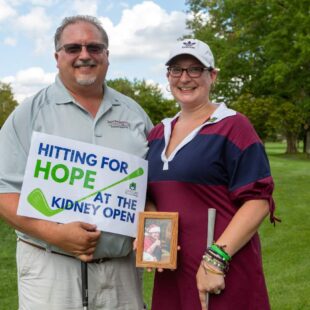The Diagnosis
Diagnosis of a medical issue that requires a life-saving transplant can produce many different emotions in caregivers and family members.
Planning for a Transplant Checklist
Regardless of the organ, age, or relationship you have with the patient, knowing that your loved one could die without a transplant can be very overwhelming, scary, upsetting, and even angering. These emotions can vary from one person to the next and are natural feelings that occur when dealing with a difficult medical diagnosis.
At the moment of diagnosis, some transplant caregivers and family members have admitted that they were very scared, which may be due to a lack of information and education about what their loved one was going through and what to expect in the future. Once they received that information, their fear and anger decreased. One brother of a kidney recipient admitted feeling very scared when he and his family initially found out about his brother’s kidney disease. He then described feeling more confident once he learned more about his brother’s condition and even better when he found out he could donate his own kidney to his brother, which he eventually did.
The education this family received helped them prepare for the future and cope better with their situation. Not all individuals and families are alike – other families and patients have admitted that too much information is a bad thing for them and they become more anxious or scared when they are given too much all at once. It is helpful to know what type of person you are: do you like all of the information “no holds barred” or a little information at a time so you have time to process it at your own pace? Letting the transplant team know how you and your family would like to be treated can be very helpful so they can try to treat you and the patient accordingly.
Questions to Ask
When the diagnosis of an illness that requires a transplant happens suddenly, families and caregivers can be overwhelmed and may not retain information or may forget to ask important questions about the transplant process. Some questions that may be helpful to ask the medical team are:
- Why does the patient need a transplant?
- Who will the patient receive a transplant from?
- How long will the patient need to wait for a transplant?
- What other treatments options are available?
- What treatment will the patient need to receive while they wait for their transplant and how will that treatment affect their life? Will they need to stop working? Will they need to be hospitalized?
- Will the transplant prolong their life?
- What will be required after they receive a transplant? More hospitalization? Medication?
- How much will everything cost? And what will happen if we can’t afford the cost?
It is helpful to keep these questions and answers written in a journal to look at when needed.
Many people who require a transplant have some knowledge beforehand that a transplant may be necessary. For instance, one mother of a patient who needed a heart transplant said she was somewhat prepared for the day they were told he would need a new heart. Her son had medical issues for many years and a transplant was always a distinct possibility. Prior to needing a transplant, this mother had a chance to educate herself on the process, and the initial diagnosis was not a huge shock or completely overwhelming. Although she was still scared, she also had a chance to become prepared and ask for support from her family and friends.
It may be difficult to prepare for a diagnosis that you had no previous knowledge of or any reason to prepare for. It is okay to call your transplant team at any time if you have a concern or question. You can also make an appointment after you compile all your questions.
It may seem scary to go home from the hospital or doctors not having all the information you would like, so you can always perform your own research through reputable websites such as www.Donors1.org or www.UNOS.org. The next step in the transplant process may also allow for some extra time to prepare for the future.







